Producer, writer, and director, Kevin Sullivan on Road to Avonlea, Anne of Green Gables, and if he plans to revive the series in the future. The Silver Petticoat Review Q&A.
*Disclosure: This post contains affiliate links, meaning, at no cost to you, we may earn a commission if you choose to buy through our links. Please read our disclosure for more information. The owners of The Silver Petticoat Review chose every item.
‘Hi, I’m Amber.’ I introduce myself to Kevin Sullivan over the phone. In a strange new world, we chat about the comforts and importance of hopeful television in times like these. He’s warm, open, a charismatic storyteller. Not surprising, since he’s the creative person behind the phenomenal success of the heartwarming mini-series, Anne of Green Gables (1985) and Anne of Avonlea (1987) and then later, the long-running award-winning show, Road to Avonlea (shortened to Avonlea in the United States).
With over 30 years of experience as a filmmaker behind beloved franchises, he has fantastic tales to tell – including how the classic Hollywood actress and superstar Katharine Hepburn affected his casting choices for Anne of Green Gables. I’m mesmerized by his stories. I grew up watching Avonlea every week as a young girl and related to both Anne Shirley and Sara Stanley. So, I hold back the temptation to chat incessantly about how much I adore Avonlea and how much his stories helped shape me into the person I am today.
In 2020, Kevin Sullivan is a man with a lot to celebrate. Over the years, Sullivan and his production company have won over 200 international awards. But it is Road to Avonlea we’re talking about today. The period drama series premiered 30 years ago on January 7, 1990, in Canada, and then on March 5, 1990, on the Disney Channel in the United States. Avonlea won four Primetime Emmy Awards, received 25 more wins, and had 90 international nominations total. Avonlea is more than a family show from the past, however. It is an artistic, innovative, cinematic series that stands the test of time and continues to find new audiences of all ages today.
RELATED: WHY THE BBC PERIOD DRAMA ‘NORTH & SOUTH’ MATTERS
A spinoff of the Anne mini–series, Sullivan continued the tales of Avonlea, focusing instead on the King children and the story girl (loosely based on the characters from L.M. Montgomery’s Story Girl books). Set in the Edwardian period (starting in 1907), Sarah Polley plays Sara Stanley, the young “story girl” who goes to live with her mother’s relatives (the King family) in Prince Edward Island when her father is accused of embezzlement. From there, the series follows the adventures of her and her newly discovered family.
Produced by Kevin Sullivan, it’s a picturesque and Romantic series that fills you with hope and nostalgia but also delivers real emotion. Road to Avonlea ran for seven successful seasons and later had a Christmas movie set during World War I, An Avonlea Christmas.
L.M. Montgomery, the author who inspired Sullivan’s original Edwardian world, would probably be proud. The tone of the series, the dialogue, costumes, the locations, the stories, the music, cinematography, and more, match Montgomery’s writing style and personality – paying a lovely tribute to her gifts and achievements as a writer – even showcasing loneliness and veiled depression.
So, whether you’ve been a fan like me for many years, or if you’re interested in discovering a beautiful, new show of imagination and romanticism to watch, look no further, and read Kevin Sullivan’s thoughts and stories about Road to Avonlea and what its legacy means to him.
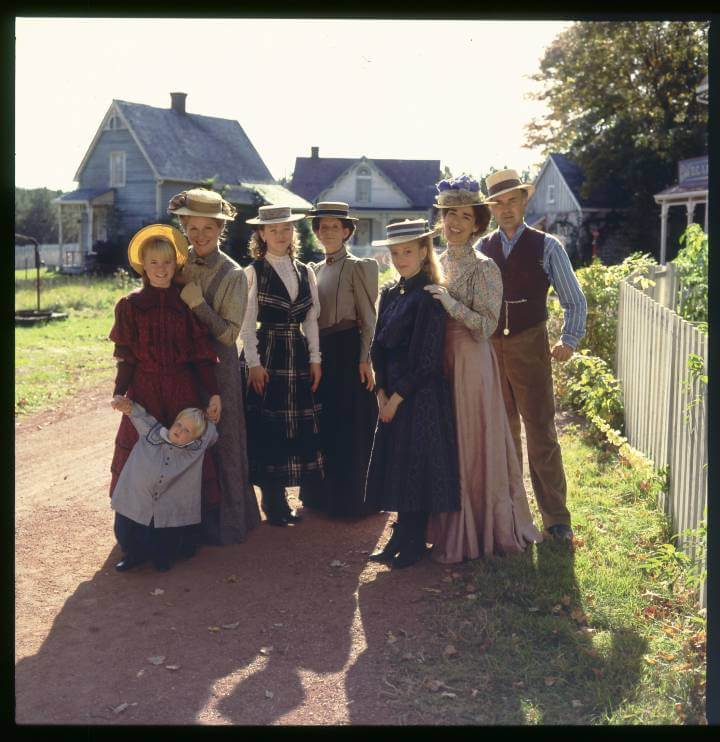
AMBER TOPPING: This year marks the 30th anniversary of Road to Avonlea. So, why do you think the show remains beloved and continues to find new fans?
KEVIN SULLIVAN: Well, I don’t know. We found the same thing with Anne of Green Gables, too.
First of all, I think it is kind of an antidote to the world that we live in, and when the series was created, we were nearing the end of the 20th century, and I think people enjoyed the fact that it was pure escapism. It was real, but it wasn’t so real that it was gritty, but it also had a component to it that mixed comedy and humor and pathos and stories about the human condition. And I think the characters and the acting and the writing drew people in. I think those were the strengths of the show.
TOPPING: Yeah. One of the things I loved about the series was that idyllic romanticism. And yet there’s still underneath that a sadness and a loneliness to many of the characters. So, I love that the show remained optimistic and felt like real people, like you could relate, like, “oh, I know somebody like this.“
SULLIVAN: That, I think, perhaps was the hallmark of it. And maybe at the end of the day, the genius of it. Because that’s, I think, what has persisted.
I’ve talked to so many people who’ve watched both the Anne films and Avonlea, and they all seem to react in the same way. It was different at that time, though, because this kind of a show is way more prolific on streaming now.
Or the style of the show… We took a more cinematic approach rather than a television series approach. And I think that also helped make this world that you could escape into really seem quite valid.
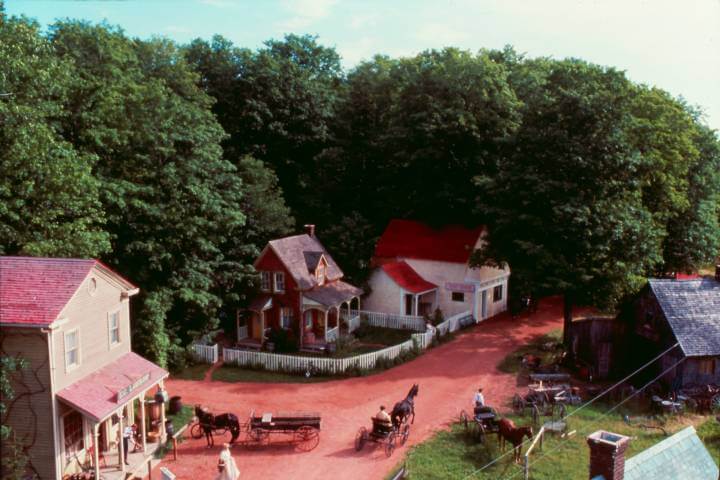
It wasn’t a made-up world. Like if you’ve watched other shows that are period like – maybe something like Little House on the Prairie. It has a synthetic look to it, and it was the antithesis of what we were going for on this show. We wanted to create something that was idyllic but really captured that time period. And to make it about people who could be harsh and cruel to each other, but at the same time, came together and bonded as a community.
And I also made the decision not to make it around a single character. Anne was much more Anne-centric. The goal of this was to create more of an ensemble. And out of that, it provided a lot of opportunities to develop guest star characters over the course of the show. Because we were producing with Disney at the time, that was part of their mandate, and part of their marketing. They wanted us to attract performers who wouldn’t always do television or had a usual profile.
And so, we had to write for an ensemble, and then we also had to write specific guest star episodes that would be attractive enough to an actress like Faye Dunaway or Dianne Wiest or someone to come in. And it was often very short notice that we were trying to cast those performers. So, we’d develop a script, and oftentimes, it was going out within a week or ten days of trying to negotiate and get the performer to commit. Let alone show up on-site and be fit with costumes, everything else. It was quite a machinery.
TOPPING: Wow. Yeah. So, did you try to approach an actor before a script? Or did you write with an actor in mind after they agreed?
SULLIVAN: Sometimes we wrote with an actor in mind. And there would probably be a shortlist of maybe two or three, maybe four performers that we were really interested in, but we couldn’t make an offer until the script was locked, and we were committed to it.
It was a little off-putting for the ensemble cast, too, because they worked well together as a group. And then all of a sudden, boom, we have a show where the dynamic was changed dramatically. And we had to try to find smooth ways of integrating that all into the arch of the series and what was happening with all the characters. So, there were a lot of plates in the air to juggle. But it was fun. I enjoyed it.
TOPPING: Did you have a favorite episode of one of the guest stars?
SULLIVAN: I should pull up my list of guest stars and see.
TOPPING: Christopher Reeve…
SULLIVAN: You know what? Probably Christopher Lloyd. He won an Emmy for that episode. And he was such an unusual performer, and he really created this delightful, eccentric actor, teacher, conman. I think it worked because he was playing exactly what was happening with the cast. He was integrating himself into their lives and then disappeared.
And he really did that when he interacted with everyone because he was really playing the role. He was not out of character, even at the craft surface table. He was always in character.
But it was one of my favorite episodes [Season 3, Episode 5: “Another Point of View”] because it had a tenderness and a poignancy to it as well. [Alistair Dimple] was run out of town in the end, and I think it highlighted the community as well and how people reacted to him. So probably, if I was going to pick a favorite, that would be it.
TOPPING: Okay! So going back a little. Can you tell me a bit about your background and how that led to creating the Avonlea storyworld for TV with Anne of Green Gables and then with Road to Avonlea?
SULLIVAN: Well, it’s really unusual, because I have absolutely no connection to Anne of Green Gables. In fact, my wife did. She was very passionate about it, as most young women are who grew up with the book. And she pushed me to investigate how I could do a movie version of Anne of Green Gables. I’d been approached by an American producer who was interested in doing it in Canada. And out of that sparked my interest, and the right situation behind it was extremely complicated. No one knew who actually owned the dramatic rights to the book.
I sorted through all of that and made it work and then got the production up and running; or started to look at getting the production up and running. Then I sat down and read the book. And I was like, “Oh my God, this is a book for 12-year-old girls. Why is everyone interested in this?”
And I have to admit; I took a second and third read before I really started to penetrate the psyche of the author. I did research on her, and I began to understand her a little bit better. And so, the challenge for me in doing it was to try to make the material work for a wide audience because I don’t think it is a book for 12-year-old girls. I think it’s also a book for adults. And I think the themes that are explored in it are, in some ways, much more appealing to adults than they are to kids because you have the benefit of looking back in time.
RELATED: Anne of Green Gables: 30th Anniversary Blu-Ray Review – A Must See For Anne Fans Everywhere
And I think in some ways the book is as much about Marilla as it is about Anne. And so, when I was doing the adaptation of [Anne of Green Gables], that was very strong in the back of my mind, that this be presented in a very unique cinematic way and that it not be something that was just to appeal to kids.
And all of that led me to Colleen Dewhurst, actually, who had a tremendous affinity for the material because she owned a house on Prince Edward Island. And that was a house that had belonged to Elmer Harris, who wrote Johnny Belinda.
I don’t know if you know that book.
TOPPING: I’ve heard of it.
SULLIVAN: It was a big movie in the ’50s with an actress called Jane Wyman, and Johnny Belinda was the name of the character, and she was mute. Anyway, it was a very important book at its time, and he was an important mid-century author.
[Harris] was also very Eugene O’Neill-like in his ability to bring actors to Prince Edward Island and had summer workshops and things like that. I think the notion appealed to Colleen and her husband at the time, George C. Scott. And they bought this house and were thinking of, perhaps, using it as an actors’ colony because she was the foremost interpreter of O’Neill in some ways in the latter part of the 20th century. So that anchored her there. And then out of that, she discovered this whole world of L.M. Montgomery and Anne of Green Gables.And at that time, I was in discussion with Katharine Hepburn, because she had wanted me to audition her niece for the role of Anne because she had always wanted to play Anne. And she approached me.
I auditioned her niece, Schuyler Grant, and Schuyler ended up playing Diana. But out of that whole process, I was trying to convince her that she should play Marilla, and she was very adamant that it would be a huge mistake because she thought it would take away, it would upstage the movie having her in it.
But one day, I was talking to her over lunch, and she said, “I think you should call Colleen Dewhurst. I think she’d be fabulous.”
So, little did I know that I was making a call to someone who was uniquely knowledgeable not only about Montgomery but the character and the whole world. And she became a very, I want to use the word almost dramaturge, in the process.
She accepted the role immediately. And it was tough to schedule her because she was president of Actors’ Equity, she was doing two movies, and we had to stand on our heads to make it all work. But when she came into that world, she took me aside one day and just literally led me out into a field where we were shooting. And she said, “I want you to know that I took a huge chance on this. She said, “This production could have been a mess. It could have been really awful, the costumes and everything. But somehow, you’ve managed to interpret it in a way that every actor who walks on stage is that character.” And she said, “I’ve been floored by it.”
So, I took it as a huge compliment because I’m a young filmmaker at the time. I had no idea what I was doing, but I guess I was making good choices, the locations, the people who were in it. I worked very closely with a wonderful costume designer, Martha Mann, who put a strong imprimatur on the film, and Colleen really responded to it.
So that was after a few days of shooting. And then, after that, [Colleen] was my armor in some ways because she helped coach me in terms of what I was doing and the way to interpret it. Not that she was standing over the director’s lens, but she was prolific with her anecdotes and commentary of what she knew, and how she also felt about Marilla as a character.
TOPPING: Yeah.
SULLIVAN: She and Megan Follows clicked immediately, so the chemistry that you see on screen is extraordinary. And I think all of that magic happened unbeknownst to me at the time that it was kind of unique.
And then, when it was successful, I was surprised, because I was concerned throughout the whole process of letting it become too sentimental. I felt one had to resist that, so I tried very hard. The material is sentimental, but I tried hard not to let it go too far.
TOPPING: Right.
SULLIVAN: Then, after that, it became a huge success. And then everyone looked at me and said, “Aren’t you gonna make a follow-up?” And I was like, “I never even thought of it.” Then I began exploring Montgomery’s other books and concluded that there was no story in there that could be able to turn into a movie the way the first book was.
So, I rifled through three other books, Anne of Avonlea, Anne of the Island, and Anne of Windy Poplars, and out of that, I curated a group of characters and situations. Then I wrote an original story that had portions of those other books in it, but they were little aspects of it, and then I kind of had to create a new original story.
And I found that process really intriguing, in some ways, because I was embarking on trying to interpret Montgomery and make the audience feel as though they were watching a book, but in fact, it wasn’t, it was an original story.
So out of that, I come to Avonlea. It was a big success with Disney and with PBS, and so everyone was spit balling and saying, “Why couldn’t you turn this into a long-running series?” And I felt that to try and do a long-running series with Anne as the main character would just run out of steam eventually.
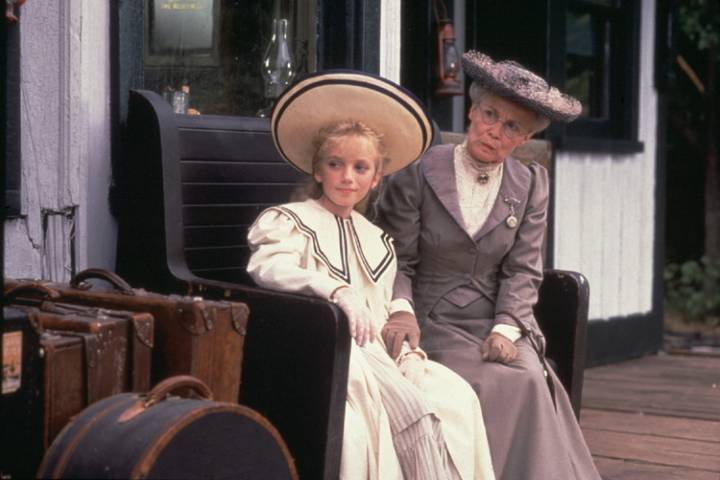
So, I thought, “Why don’t I look at some of Montgomery’s other books and try to take the same approach?” So, I did. I went through books of her short stories, Chronicles of Avonlea, and Further Chronicles of Avonlea, and The Golden Road, and The Story Girl, and I found this whole collection of characters because they were more anthological stories.
There wasn’t a big story arch or anything through it, but out of that, I was able to curate again quite a wonderful cast of characters, and then created my own world, essentially. And it was probably more off the radar than Anne the sequel, but it was the only way that I knew how to do it.
And so again, I tried to use the dialogue that was in the books, Montgomery’s turn with words, the way she looked at the world. I tried to make those things the touchstones that I was seeing this world of Avonlea through, but it did become quite original.
And then, of course, when we started doing guest characters and everything else, it took on a life of its own. Probably the first two seasons, I was using literary material as a launching pad for myself, and with the other writers, I was working with.
TOPPING: And then some of the original characters that were made up for the show started coming in, like Gus.
SULLIVAN: Yes. So, from The Story Girl, you’ll get the King family, and Sara Stanley and then we broadened it to Janet’s sister and the Pettibones, and I brought back Miss Stacy from Anne of Green Gables, and I made her a character. And then the more characters you added into the mix, the greater the opportunity. It became exponential.
TOPPING: So, were there any other challenges of adapting the books to the screen?
SULLIVAN: Well, no, because it was emancipating by that point. I wasn’t too hamstrung by the literary material. I was making an original world. So, at that time, the biggest challenges were just the scale of the production, because it was large and had a lot of speaking roles in it. And we were shooting on location. So, the town of Avonlea that you see is a town that we built.
I used a building that was the back of Green Gables in the original Anne of Green Gables movies, and I turned that into the King farm. And we painted the building a different color, but it sat very nicely in this landscape of rolling hills. It was really bucolic and rich and then built the town on that same property at another portion of the property. But the property gave us not only the fields that look of Prince Edward Island but backwoods and roads and trails.
So, what we’d do is we’d build a lighthouse, for example, on the property, and then we would film that lighthouse on Prince Edward Island. So, what we had was a replica on the property, and then we would film at a real lighthouse on Prince Edward Island or same with Jasper Dale’s cannery. We built the cannery on location, and we’d have fish and birds and everything else flying in, and then we’d also film on Prince Edward Island, and that would be the other side of the cannery, so you had the water. So, it was really seamless. It made it look like it was actually shot on location in the Maritimes. But, in fact, it was a lot of, as you say, trompe l’oeil. It fools the eye. It just was a way of doing it that made sense production-wise, but it was a challenge because it was a lot of moving parts.
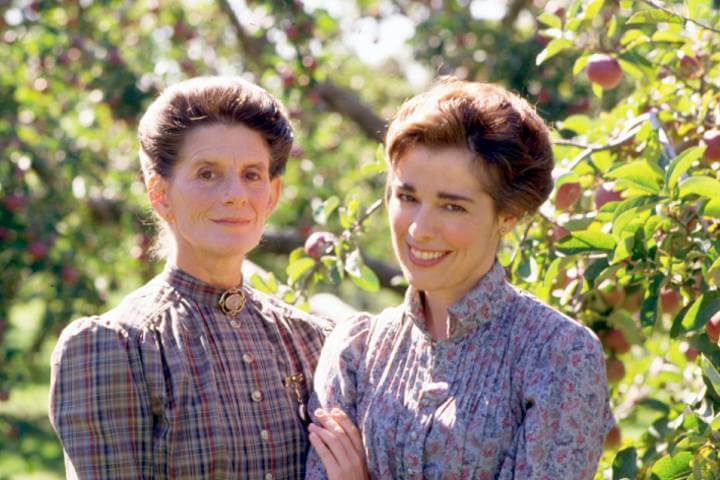
TOPPING: So, what was it like working with the cast of Avonlea?
SULLIVAN: They were, I guess in a word, everybody was pretty unique.
When I cast all of those performers, my goal was to find the very best actors that I thought existed in Canada that would be part of this. And so, having somebody like Jackie Burroughs was a godsend because I’d worked with her once before. She had a small part in Anne of Green Gables, where she plays the woman at the speaking engagement at the White Sands Hotel that gets up and performs that opera.
I never worked with Jackie, but I knew that she was like a virago, and she was a delight because she took the part very seriously, even though we hadn’t really written it.
And I remember the first episode that we shot was out of sequence, and it was a Colleen Dewhurst guest star episode. [Jackie] was appearing for the first time, and she was literally upstaging everybody in the background. And I had to have a few words with her afterwards, and she said, “Well, I’m just trying to create my character.” And lo and behold, she did. She became a character that you love to hate, and yet she was very poignant, and she could do things that were wonderful comedy. She did all her own stunts, backflips out of a boat, falling in the mud, falling in the snow. She insisted on doing it all.
And yet, there was such a broken tender heart underneath all of that. You could give her material that was so moving at any point, and she was really wonderful at being able to play that huge range—just an amazing actress.
So, because of that, I feel like the other actors all fell into line. She was broader, I would say, than many of the other actors who were playing a little bit more realistically, but she did have great comedic instincts and great pathos, and everyone responded to that.
Although I remember once, Cedric Smith coming to me and saying, “You’ve got to write this for the men. These women are just upstaging everything.” And it’s true. There was a high, maybe a little bit more preponderance of female roles, and once you let that posse go for it, some of them would just go crazy.
The hats, and the clothes—they would chew up the scenery if they could.
TOPPING: Yeah. But still, Hetty worked so well. She’s such a great female character, and you really do feel her performance.
SULLIVAN: She really is. When you have an actress like that, you write for her strengths, and that’s what we did constantly. We, again, cultivated the material so it would work with her. And I found that an interesting challenge, too, because the series started to take a different tone partly because there was such freedom in developing it. Everyone would say, at the broadcaster, well, what’s gonna happen? We have no clue. Let’s wait and find out.
And so, scripts developed and evolved based on the fact that we did have a tremendous amount of freedom to develop what we wanted. And around about the end of the fourth season and into the fifth season, I would say, the themes that we began exploring were a bit more profound.
I mean, one episode with Jackie, that we wrote for her, was called “Memento Mori, Remember You Must Die.” It was about her crisis as an author and as a person who wanted to communicate, which was very similar to Montgomery.
And what happens when you go back in time and see what it was like for her growing up, and why she made certain decisions about what she was going to do. She learned in the process that she needed also to write to her strengths and that she was fully capable of expressing herself on that level.
So, it was a touching, poignant story, but it also explored emotions and themes that we hadn’t really explored before.
TOPPING: I remember that episode. I loved it. But I’m a writer, so I relate to it.
SULLIVAN: Okay. Well then, yeah, you can appreciate it. The launching pad for it was an episode in season four called “Home Movie.” I don’t know if you remember that one, where Jasper decides he’s going to change the speed of film from 18 frames a second to 24 frames a second and make it more realistic in his pitch that he’s giving to the Edison company. And in the process, he ends up filming the town, and the town is about to be taken over by an American corporate entity who’s going to turn it into a company town.
Jackie gets up at the end of the episode when all the town is corralled in the hotel and ready to vote. She ends up playing Jasper’s films and shows the people in the town who they really are, and they are laughing and crying, and then she gives this very stirring speech at the end, which I’d written for her. So, it was also doubly moving to see the connection that she made in it because she talks about 100 years from now when people look at us and see us, they will know who we are because of these movies.
And she talks about the mystical side of what Prince Edward Island is. And she talks about what it’s like to come from that environment. I watched it recently, and I was actually stunned by it because she’s so good.
I think that’s an indication of where things in the series start to change a little bit, and we had the freedom to explore themes a little more profound. So as the audience, like yourself, is growing up, we were giving them different things to think about. So, the goal was to entertain an audience but also to enlighten them about themselves.
TOPPING: Well, I think you succeeded! Because growing up, you watch it week to week, at least that’s what the experience was for me. And then I was able older to go back and watch it and this show really stands the test of time. Because sometimes you revisit things from your youth, and they don’t hold up. But this show, one thing that’s so great about it is that anyone of every age can watch it and enjoy and be enlightened in some way and I think that’s something special about the show.
SULLIVAN: Well, thank you, because that really was what started to become my goal at the time. It probably wasn’t that when I set out because I was also learning about show running. I wasn’t used to running 13 episodes that had to be shot in 26 weeks or whatever, so there was a production learning curve for me, as well as a writing learning curve and trying to figure out how to do all that. Somehow, though, once you cross the Rubicon and you’re in a world, and you’re creating it, then you can do you have to go in different places with it.
In fact, I found certain writers that maybe I started with at the beginning of the series no longer wrote or were really in the headspace of writing in the direction that I wanted to take it. That was an interesting development. It’s like casting a performer, and they’re really good in this or casting a young performer, but when they grow up, they don’t play the same way.
So, I think some of that certainly came through. But the other thing, I agree with you, because when we watched Road to Avonlea on Gazebo, for example, all the episodes were restored. Everything was restored from the original negative and turned into HD.
So, I was looking at the show with fresh eyes too. And I must say, I’ve never sat down and watched the whole thing. Again, I was more in charge of the Anne of Green Gable’s restoration, which was really massive, and Road to Avonlea was kind of being handled by a different team. But I’d often be stunned. I’d be watching young editors working on it, and I’d watch them laugh, and then I’d see them completely get engrossed. They weren’t doing their job. They were watching the show.
And so, I had a chance to talk to them about it, and that’s exactly the way you’ve responded to what I’m commenting on now is the way people have seen it. And that’s a great compliment for me because I’d almost forgotten that’s what I was trying to do with it.
You put things away. You don’t even think about things. It’s only when you go back as the filmmaker, and you look at them again, you go, wow, that works well. My goodness. I’d forgotten that we were trying to do that.
So, one of these days, I’ll have to sit down and actually immerse myself in it again.
TOPPING: Well, it’s a good experience, at least as a viewer, to re-watch.
SULLIVAN: Well, that’s a great compliment. Thank you for saying that.
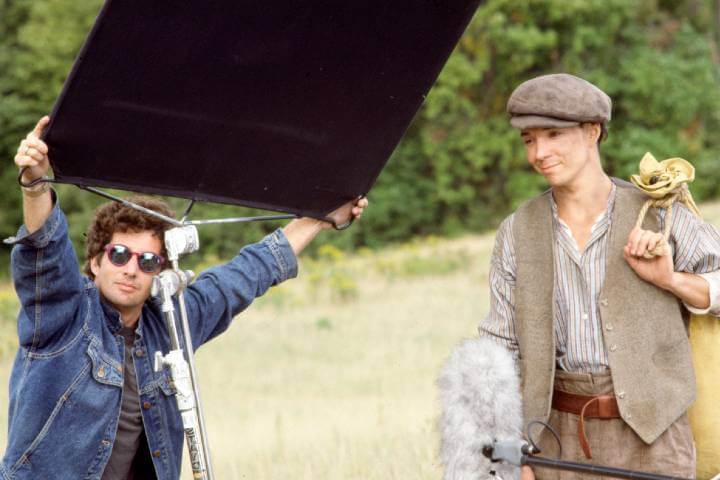
TOPPING: So, I have to ask about Gus because Gus became such a fan-favorite character for so many people watching the show. Did that surprise you, or why do you think he became such a beloved character, and where did the idea for Gus come from?
SULLIVAN: Okay. Well, we were in the second season and working in the writers’ room, and we were trying to come up with different ideas, and one of them was based on a Montgomery short story.
And it’s about a young boy who had this incredible ability to play music, and his relationship with a teacher, but he had this whole specter in his background because of his father, and his father was very harsh. It immobilized him, and the teacher helped him get over that hurdle.
So, then we started looking at different ways of interpreting it, and of course, Hetty, teacher, boom. She became the instant catalyst for that kind of an episode. And we started writing Gus in a way that was almost very rough, and he was inarticulate in some ways, and then music became his means of communicating. We were looking at things like The Corn Is Green, for example, that has that same sort of story being told.
And so that’s where all those influences ended up creating Gus Pike. But we had no idea who Gus was going to be. We were auditioning everybody, and it was like trying to find Anne. We couldn’t find anybody that we thought was good, and then one day, one of the casting directors. No, she was an exec. She was previously a casting director, and she was an exec.
I was having a party, and on a deck, and she said, “You know what, I took the liberty of inviting this young actor because I think you should meet him.” So literally, I took him downstairs, because the deck was on the back of our office, and I went downstairs with her, and we were introduced. She was really bold. She said, “Well, I think you should audition him right now.”
So, we did literally turn the camera on him and auditioned him, and he was quite extraordinary, for this part anyway. He just…it was magical. He just fell into it, and he had that roughness, and the accent was his own invention. But it made him seem like he was of that Maritime world. And then we developed the whole story with Gus’s father and Captain Crane and that whole convoluted world.
Gus’s father was a real ne’er-do-well and very scary. But it gave him a lot of breadth as a character. And then, once he started to click with Felicity, then that provided a whole other thread that we were able to capitalize on and develop.
In this experimental world, you often don’t know where actors and the stories will take you, and so you have to be able to seize the wind as it blows and try to find stories that are compelling. He was just a natural, I think.
TOPPING: Yeah. And I remember growing up watching it, and you have Gilbert from Anne of Green Gables and then Gus on Avonlea being the ideal romantic guys for girls growing up.
SULLIVAN: Well, it’s interesting, because I wouldn’t say I was thinking that at the time. I just thought he was great for the part.
But something happened though. Unfortunately, Jonathan Crombie [who played Gilbert] passed away in 2016. Suddenly, in every major paper and magazine, we were getting covered in Vanity Fair, Vogue. Everybody was writing about Jonathan. All these women were coming out of the woodwork and saying, He was my ideal when I was growing up, and Anne of Green Gables was kind of like the secret, coded world that you didn’t talk about. The Breakfast Club was cool, but Anne wasn’t cool, but everybody really clicked with it.
And this outpouring over Jonathan. I realized that the same thing happened with Gus too because our fans were telling us that in spades.
TOPPING: Yeah, I mean, it’s surprising when I’m running my website, where I cover a lot of period dramas and romance… You start to discover that Anne of Green Gables and everything with Gilbert – that he was quite popular in a Mr. Darcy way amongst a lot of fans, which is very interesting.
SULLIVAN: Yeah, it is, because Jonathan, again, was a last-minute casting decision. Actually, Sarah Polley’s mother was the casting director on the first two Anne films. And I attribute the success of the cast completely to her. She just knew how to find wonderful actors that were right for the part. In fact, other people had been cast.
There was another big actress cast for the role of Rachel Lynde. It became very complicated with her schedule, and we realized it was never going to work out, so Diane Polly literally brought Patricia Hamilton to the set as we were shooting, and, again, put me in a trailer with her. She read for me, and Diane said, “You know what? It doesn’t even matter what she read. Just cast this woman.”
TOPPING: She’s so amazing.
SULLIVAN: And she went on and had an incredible life as that character because she was so wonderful. And same with Jonathan. I never actually saw Jonathan. I saw a picture of him with his family on holiday in Disneyland, but she had seen him in a high school play, and she came in that day, and she said, “He’s on holiday, but I’m telling you, this is the guy.” And I took a deep breath and said, “Okay.”
TOPPING: Well, it was a good choice!
SULLIVAN: So, he was quite remarkable because he had no film experience. But Megan Follows had tons. And she was wonderful with him, and she knew all the technical stuff, hitting your mark, how to handle the lens, all of that. That was a non-issue for her. And so, she helped coach him through that, because he would be very nervous when he came on set and she was able to allay his jitters, and out of that came this really remarkable chemistry between the two of them.
TOPPING: So, speaking of romance. Do you have a personal favorite romance on Avonlea?
SULLIVAN: Let me think now. I have to go back in time because that’s a tough question when there’s so many different moving parts.
I don’t know. You know what, if I had to place my finger on it, it would, and this may sound completely offbeat because it’s not conventional, but I really liked Jackie’s romance, Hetty’s romance with Romney Penhallow.
TOPPING: Yes. It’s one of my favorites too.
SULLIVAN: I remember as we did that, once again, she brought great poignancy to it because she was playing an old maid. And if you knew Jackie, Jackie was like the all-time rocker. She was kind of like Grace Slick. She came from that whole generation of the ’60s, drugs, everything. She was not who you saw on screen. But the fact that she was able to transform herself, and particularly in that episode, she played it as a mixture between Katharine Hepburn and Maggie Smith. She just ended up getting those qualities and invested them in the character, and I felt like that was a great launching pad for her, a turning point.
We brought her into other romances, like with the shoe salesman and all kinds of other things.
TOPPING: Right.
SULLIVAN: The other one that was very sweet was when Felicity falls in love with David in, I think it’s the second season. The guy who she meets in a field on a horse and that was very romantic. We were playing cricket in front of a hotel. But those are early episodes. It’s funny because the bigger things happen later on. Like one episode that I liked was Stockard Channing playing a minister’s wife, and she and Janet have a great friendship. And I like the friendship that two middle-aged women could have. And then she’s got really serious problems, a drinking problem, like a drug problem, and Janet helps her, and she helps Janet.
And I thought that was a very different, mature type of material to expose our audience to. But it really worked. I think it was the genuine character of the women that did it. And that was kind of a romance in a way because Janet had never met anybody like that before. And all of a sudden, this woman took her on a journey, an unexpected one that had dire consequences.
And then, of course, her son falls for Sara, and that was nice to be able to play that. And then there was another episode too, where Sara falls for the traveling rodeo guy that was played by Treat Williams, and that was very sweet too.
TOPPING: Now I don’t know if you know this, but I noticed on message boards that some fans were hoping for a Sara and an Arthur romance, Arthur Pettibone. So, what do you think about that?
SULLIVAN: Well, we did kind of explore that. I think at the time, we just thought the chemistry wasn’t clicking. And I can’t remember why. But I remember it was bandied about frequently in the writers’ room, but it never really took off.
TOPPING: Yeah. It’s interesting how fans can take something that they notice and then build upon it and create fan fiction for it.
SULLIVAN: It is extraordinary because maybe about 15 years ago now, we started an online forum and a lot of fans communicated with each other that way.
They also developed a thing called AvCon out of it, where they have conventions. A thousand people would show up where we filmed, and they put it all together themselves, and they’d invite the actors, and it was really interesting. But they did a lot of fan fiction where they would write online their own stories, and I was fascinated by that, that the world was still so palpable that they wanted to see it go on and on.
TOPPING: I think that Avonlea and Anne of Green Gables, that whole continuation of it, really plays to that. I’m writing my master’s thesis on transmedia storytelling right now…and about participatory culture and all of that. And Avonlea is transmedia, going from one media platform to another, and then the fans start participating, which is fascinating. I think it’s the perfect world for [transmedia].
SULLIVAN: Oh, and transmedia means that, is it like starting as a book and then going to-
TOPPING: It can start from different areas. So it’s like you’re telling a story across different media platforms [Henry Jenkins’ definition: A story “gets dispersed systematically across multiple delivery channels for the purpose of creating a unified and coordinated entertainment experience”], so it can start from a book, it can start from a movie, it can start from a video game. Transmedia can even be social media.
SULLIVAN: I see.
TOPPING: So many different aspects to it, so even the fans can be part of it…it’s very interesting.
SULLIVAN: What I found fascinating out of [the AvCon] experience was seeing … people showed up at our set to have a wedding and stuff like that. They would rent it.
TOPPING: Wow.
SULLIVAN: I mean, that was remarkable. Or they’d have these conventions, and everybody knew each other like I didn’t know them, but they all knew each other. They were all best friends.
TOPPING: That’s awesome.
SULLIVAN: And they co-existed with the world, in some ways. They were like die-hards. They knew absolutely everything about it. I know that happens and, Star Trek conventions and everything else, people know more about it than the people that make it, but I found their resourcefulness amazing. And I think it was that desire to actually step into the world. I heard that Downton Abbey, the building that they shoot Downton Abbey at, had a weekend where they were going to open it all up as a lavish B&B. And the thing’s booked like a year in advance. So, people want to step into worlds and really experience them, and I’ve seen that on Avonlea for sure.
It was very heartbreaking when we had to take the town down. We had to get a license every year to keep these buildings up from the township that we were filming it in, and as the day came when we were not going to salvage the buildings, it was over, and people found out about it. As the trucks came in to take stuff down, people were there just trying to grab little bits and pieces of it. It was really poignant, actually.
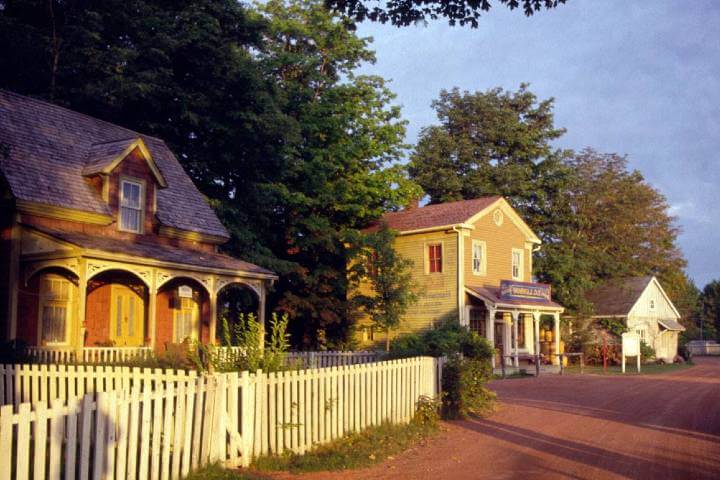
TOPPING: People connect to the place, the location, almost as a character in and of itself.
SULLIVAN: It does. I would say that whole world that I filmed had its own indelible character. I think that probably contributed to what people liked about it and experienced. It was so interesting because it wasn’t Prince Edward Island, but it looked like Prince Edward Island. And it was convenient to film at it, so a whole bunch of production issues made it what it was, but it also had its own magic.
TOPPING: So, people are nostalgic for the past right now, and it’s becoming a huge trend to revive or reboot past shows. Is that something you’ve considered with Avonlea, or do you think you’re finished with the Avonlea story?
SULLIVAN: No, it’s been bandied about. It may have another life. One of the senior writers who was working with me on it actually developed an extraordinary pitch for it. It’s fabulous because he’s taken all the younger characters, the ones who were babies at the time, and made them young adults. He’s reinvented the world, so it may have a life.
TOPPING: Well, I’m sure there would be a lot of happy fans if it ever happens.
SULLIVAN: It would be great, actually.
TOPPING: Where do you think the characters of Avonlea are now? Do you have any imaginings of where they might be, or would you rather leave it to the imagination of the fans?
SULLIVAN: No, we have worked it all out.
TOPPING: Oh, interesting.
SULLIVAN: I’d go so far as to say that Jasper went to England and had a whole career there and then moved back to Prince Edward Island and all the issues around their family, what happened to Felix, who he got married to, he has a little girl, what happened to her, what happened to Cecily, their lives have all been worked out.
TOPPING: Wow.
SULLIVAN: I mean, it still does exist on the page right now.
TOPPING: Oh, that’s awesome. Well, there’s many, me included, who would want to find out in some way what happened to all of these characters.
SULLIVAN: Great. Well, keep your fingers crossed.
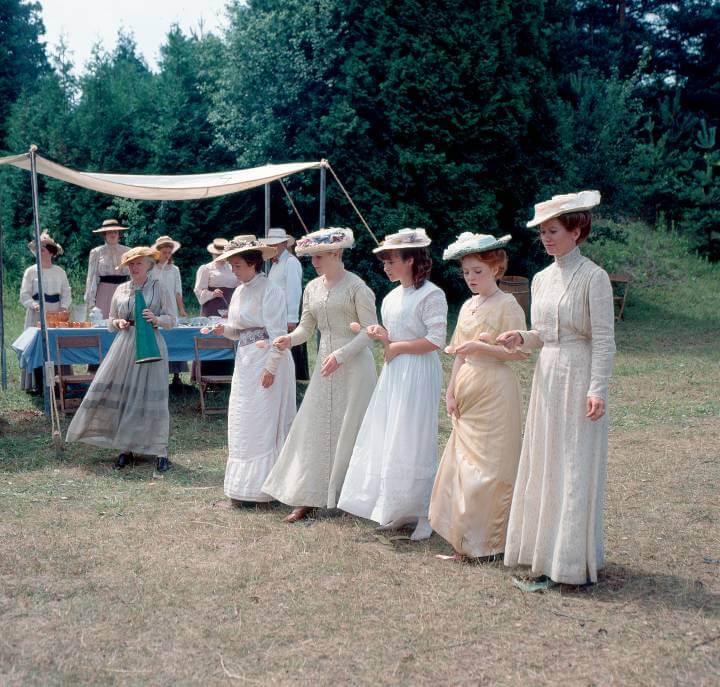
TOPPING: Okay, I will! So, what do you hope the lasting legacy will be of Road to Avonlea? What do you want people to remember or take from the series, or what does the series ultimately mean to you?
SULLIVAN: Well, I think Jackie did a wonderful ode at the end of the last episode, when she’s toasting at Felicity’s wedding.
And it finishes on a pan of the town and everything. Again, she just was able to conjure up the feelings that you feel about that place and do it with great emotion and a sense of humor. I think probably I’m hoping that feeling is what people are left with at the end of the day.
Rather than a specific, it’s more of a sensibility, I would say, than specific stories.
It’s a place that you want to escape to because it’s the last vestige of a time when things had their own proper place in the world, and human beings, as I said, could be not nice to each other, but somehow the sense of a community, and a sense of decorum, ruled.
I mean, we live in a world that is the antithesis of that now. And the reason is we’ve had incredible upheaval since that time period. You look at most of the 20th century, and you even look at our lives now. So there’s something stable, I think, about an Avonlea that people can find reassuring, because it has a sense of value and a sense of morality, and a kindness to it, I think, that people like and want to hold onto.
TOPPING: Yeah. I agree with that. I often find myself revisiting Anne and Avonlea, especially when down in the dumps or something. It’s the perfect type of show to turn on, and it’s also nostalgic, but it also, as I said before, stands the test of time, and you can learn something new from it, from an older perspective.
SULLIVAN: Oh, that’s great.
TOPPING: So, it’s a show that you can revisit.
SULLIVAN: Viewers, if they want to watch Avonlea, they can watch it on Gazebo TV and stream it.
TOPPING: I’m hoping new people find their way to it because now I think is the perfect time to discover the show if they haven’t already. Sometimes I find people who’ve never seen it.
SULLIVAN: Yeah, no, it’s true. I think a lot of people who may have watched Anne with an E on Netflix have found the original Anne of Green Gables, and out of that, they’re finding there’s another 93 hours on Road to Avonlea!
TOPPING: Yes, it’s the perfect time, especially for the younger generation right now who are discovering through Anne with an E that there’s other Montgomery worlds or Avonlea worlds that they can watch. And, I think new people can come to it and still, in contemporary times, be able to relate to it.
SULLIVAN: Yeah. Well, fingers crossed, let’s hope that people find it and find that pleasure in it.
This interview has been edited for length and clarity.
You can read more about Road to Avonlea on the official site: roadtoavonlea.com.
Where to Watch Road to Avonlea? (Plus, Get a 10% Discount at Shop at Sullivan!)
Check out the entire Road to Avonlea 30th Anniversary Collection over at Shop at Sullivan (Affiliate link). There, you can buy the complete series (remastered for widescreen). You can also buy Avonlea books, artwork, and other fun memorabilia! Whether you’ve been a fan for 30 years or you want to check it out for the first time, now is the perfect time to watch and celebrate the show. Enjoy! Make sure to use the discount code below to get 10% off.
10% Discount Code: SILVERPETTICOAT
The series is now also available to stream directly to your TV! You can rent or buy Road to Avonlea to watch on Kevin Sullivan’s official streaming service, Gazebo TV. Note: The discount code only works for Shop at Sullivan and not Gazebo TV.
Photos courtesy of Sullivan Entertainment.
*Disclosure: This post contains affiliate links, meaning, at no cost to you, we may earn a commission if you choose to buy through our links. Please read our disclosure for more information. The owners of The Silver Petticoat Review chose every item.
ARE YOU A ROMANTIC REBEL LIKE US? FOLLOW THE SILVER PETTICOAT REVIEW:
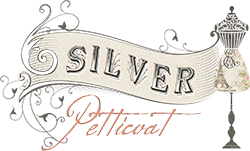 Our romance-themed entertainment site is on a mission to help you find the best period dramas, romance movies, TV shows, and books. Other topics include Jane Austen, Classic Hollywood, TV Couples, Fairy Tales, Romantic Living, Romanticism, and more. We’re damsels not in distress fighting for the all-new optimistic Romantic Revolution. Join us and subscribe. For more information, see our About, Old-Fashioned Romance 101, Modern Romanticism 101, and Romantic Living 101.
Our romance-themed entertainment site is on a mission to help you find the best period dramas, romance movies, TV shows, and books. Other topics include Jane Austen, Classic Hollywood, TV Couples, Fairy Tales, Romantic Living, Romanticism, and more. We’re damsels not in distress fighting for the all-new optimistic Romantic Revolution. Join us and subscribe. For more information, see our About, Old-Fashioned Romance 101, Modern Romanticism 101, and Romantic Living 101.
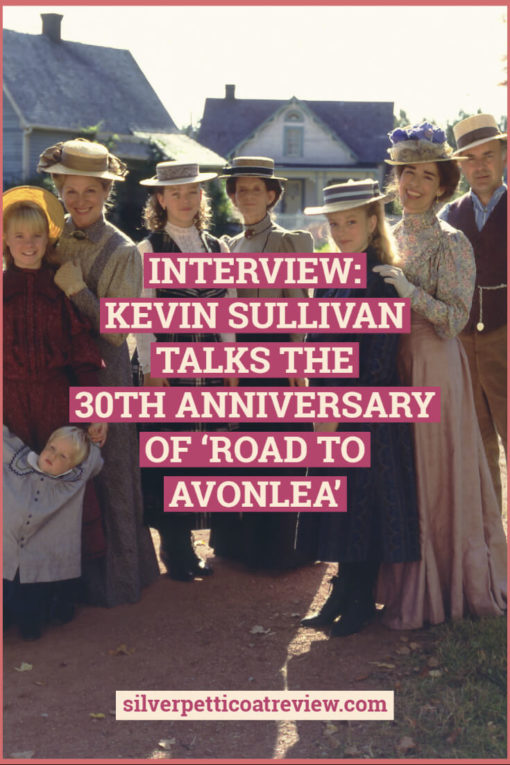

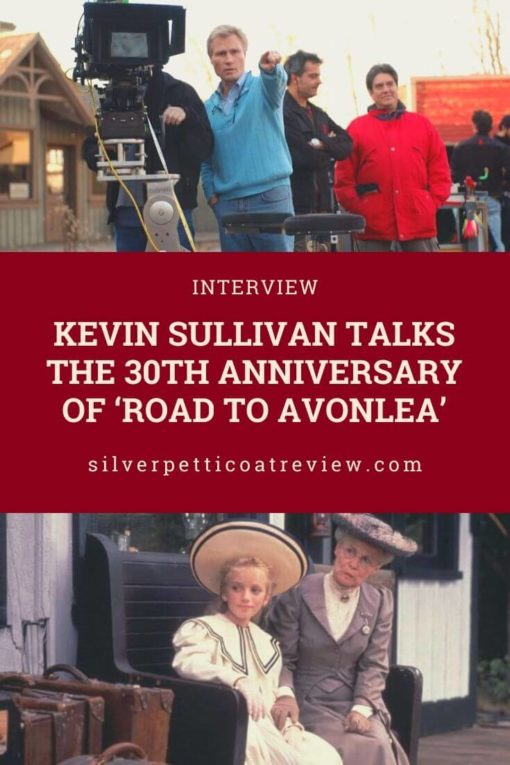
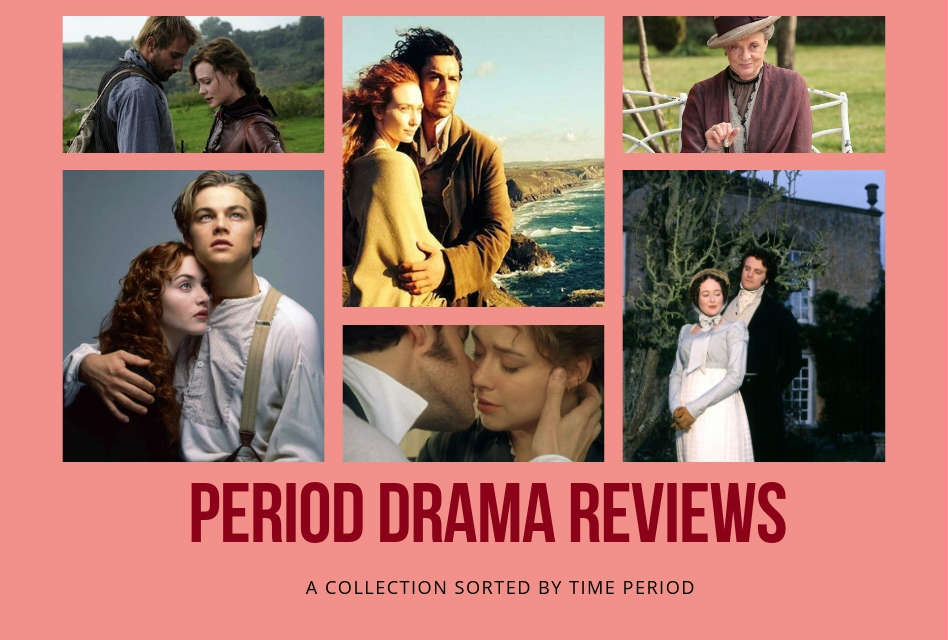
As a child I watched every Sunday morning Road to Avonle, it was the 90s.I felt love for this series from the beginning.Children’s adventures, beautiful music, today when I hear this musical theme, I have tears in my eyes and a strange warmth in my heart.It’s hard to describe it as a return to childhood.Then I discovered Anne, and I also loved and watched thousands of times. Kevin Sullivan movies have the power to penetrate the human soul.Greetings from Poland❤❤❤❤❤
Hi, Chris! I completely agree with you. They do have the power to touch the soul! Thanks for your thoughts.